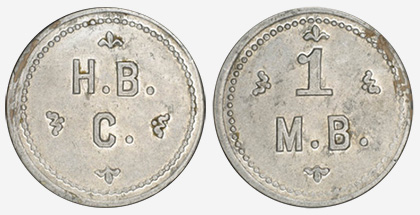Cree loan words into BC Chinook Jargon

Hudsons Bay Company, 1 ‘made beaver’ token
Yesterday, in my article about Walter Moberly’s cool 1885 book “The Rocks and Rivers of British Columbia”, I asked about a word that some apparently Columbia River Shuswap (Kinbasket Secwepemc) guys used, likely in Chinook Jargon. I wrote:
I’m curious about another word. On pages 84-85, boot tracks are found, “which the Indians at once said were ‘Moneasses’, or men from the east, unaccustomed to mountain traveling.” Any ideas?
My extremely knowledgeable colleague Dale McCreery piped up:
moniyas! A white guy, in Cree.
Hayu masi, Dale!
Interesting that word was explained to Moberly as ‘men from the east’; possibly it meant that specific kind of white guys: Canadians as opposed to Boston ‘American’, King George men ‘English’, and pasayuks ‘French’…
Now, from moneasses to money:
There’s been next to no documentation about the role of Cree or Saulteaux (or for that matter Iroquoian languages) in Pacific Northwest history. So this discussion is a good occasion for me to bring up something that’s been on my mind for years…
There’s a word for ‘money’ known in southern interior BC Chinook Jargon, given as <snoweah> by John B. Good in 1880, and as <sunia> ‘gold, legal tender’ by Edith Beeson in her 1971 book of Lillooet-area history “The Dunlevey”.
I dug up my nłeʔkepmxcín (Thompson River Salish) dictionary to remind myself of a similar word for ‘money’ in that language: snúye, glossed as both ‘money’ and ‘beaver’, and parsed by the compilers as Salish prefix s- plus an abstract root √núyeh not found anywhere else in Salish. Hmm…not found anywhere else in Salish, eh?
Whereas in various Salish languages, under fur-trade influence, the native word for ‘beaver’ has acquired an additional sense as ‘money’. For example in St̓át̓imcets (Lillooet Salish) there’s sqláw̓, which reflects the Proto-Salish root for ‘beaver’. This regional metaphor likely influenced the Thompson speakers who glossed their ‘money’ word for the researchers.
I’ve also found a <sooniya> ‘money’, in the unrelated Carrier (Dene/Athabaskan) language. As far as I know, this word isn’t analyzable into meaningful native components there either.
In the Alberta Elders’ Cree Dictionary I find ‘money’ as sônîyâw — surely this form (from one Algonquian language or another, unrelated to Salish or Dene) is the source of all the preceding, perhaps via Métis fur-trade employees?
I’d love it if someone knowledgeable about Cree could comment on this suggestion.
I wonder if there are more examples of purely Cree-looking words coming into PNW usage?
(As opposed to the long-known Algonquian stuff in Chinook Jargon, such as tutúsh ‘milk, breasts’, mitás ‘leggings’, músmus ‘cow’, papús ‘baby’, etc., most of which I feel carry the marks of Métis French or Michif, or English.)

Soniyaw, moniyaw, peyak-keekwaay! – money, whiteguys, all the same thing.
LikeLike
Moberly Lake is named after Henry John Moberly, brother of our author Walter
(http://www.mountainmetis.com/pages/henry_john_moberly.html)
LikeLike
The place to ask is here.
LikeLiked by 1 person
What a great website! I need to add them to my blogroll, thanks David
LikeLike
Pingback: Loanwords into BC Interior Languages: Métis Traces | Chinook Jargon